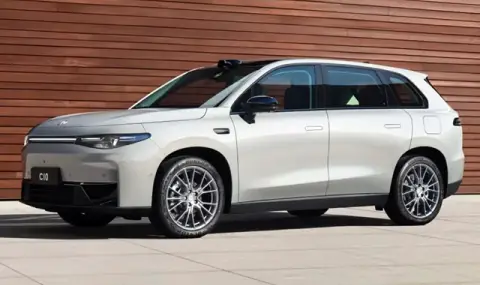Automaker Stellantis expects to rapidly increase sales of Chinese-made electric vehicles abroad through a new joint venture with Leapmotor, the business of which will start this year. The announcement comes amid growing geopolitical tensions surrounding Chinese-made electric vehicles in the US, Europe and other regions.
Expansion plans do not currently include U.S. distribution, said Stellantis CEO Carlos Tavares, citing, among other reasons, new U.S. tariffs on Chinese-made electric vehicles.
After Stellantis CEO Carlos Tavares and Leapmotor founder and CEO Zhu Jiangming shake hands, Stellantis expects to rapidly increase sales of Chinese-made electric vehicles outside the Celestial State.
The companies said that from the beginning of September, sales of the Chinese-made cars will begin to be sold through Stellantis' distribution networks, including in Europe. This most likely means that the importer in our country of Alfa Romeo, Chrysler, Citroen, Dodge, Fiat, Jeep, Lancia, Maserati, Opel and Peugeot will also start selling the Chinese cars in question.
These markets will be followed by the Middle East and Africa, India and Asia Pacific and South America in late 2024, the two companies said in a statement. However, the USA is not included in these plans, Stellantis CEO Carlos Tavares also said.
His remarks, quoted by cnbc, were made immediately after a press conference in Hangzhou, China, where Leapmotor is based. That's due in part to new U.S. tariffs on Chinese-made electric cars, Tavares says.
The joint venture's expansion plans include at least six electric vehicles by 2027, according to a presentation by Stellantis and Leapmotor. The cars, initially budget vehicles, are expected to complement Stellantis' current vehicle lineup, the two companies said.
The announcement comes amid growing geopolitical tensions surrounding Chinese-made electric vehicles in the US, Europe and other regions. Many in and around the auto industry fear that cheaper, Chinese-made vehicles will flood the markets, undercutting domestically produced EVs.
„From Stellantis' point of view, our position is that we compete. We compete with the Chinese automakers and compete as hard as we can because that's the best way to learn. This is the best way to stay in shape for the global race we are now participating in,” said Tavares.
Tavares also said that the Chinese automakers, which he previously called Stellantis' biggest competitors, are expected to expand rapidly internationally -- with or without the help of joint ventures.
„Whether I like it or not, with me or without me, Leapmotor was going to be in Europe anyway... maybe not as fast, maybe not as strong, but they were going to come to Europe,” Tavares said. “What I am doing is just trying to be opportunistic against the dynamics that the Chinese car manufacturers have created.“
Chinese companies account for 8% of all-electric vehicle sales in Europe, but could increase their share to 15% by 2025, the European Union said last year. The EU believes that Chinese electric cars undercut the prices of local models by around 20% on the European market.
„The partnership between Leapmotor and Stellantis has demonstrated a high level of effectiveness, opening a new chapter in the global integration of China's intelligent electric vehicle industry,” said the founder, chairman and CEO of Leapmotor. “We believe this collaboration can propel Leapmotor to become a respected world-class intelligent electric vehicle company.“
The companies declined to disclose sales volume expectations for Leapmotor vehicles sold through Stellantis' sales network. But Leapmotor reports deliveries of 144,155 vehicles in 2023, a roughly 30% increase over the previous year.
Stellantis owns 51% of the joint venture with Leapmotor, announced earlier this year and involving a €1.5 billion investment in Leapmotor for an approximately 21% stake in the company. As part of the deal, Stellantis has exclusive rights to export, sell, and manufacture Leapmotor products outside of China.


